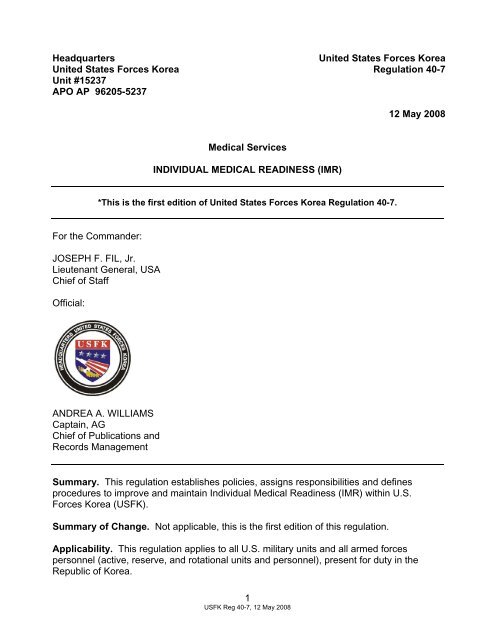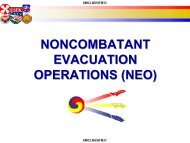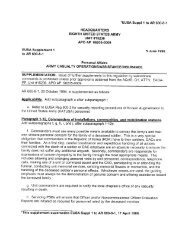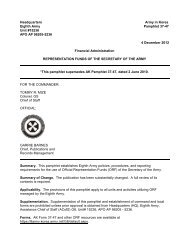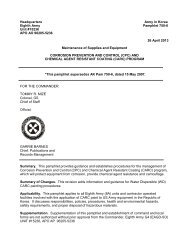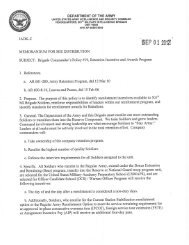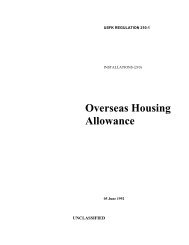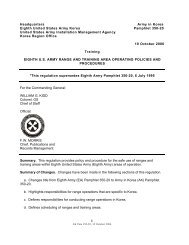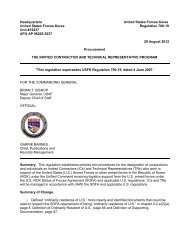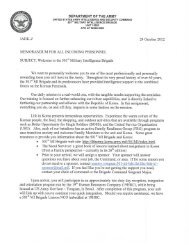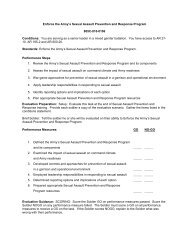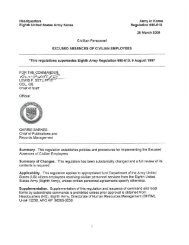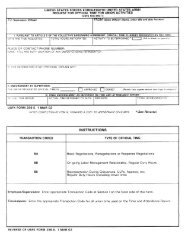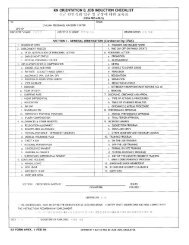USFK Reg 40-7 Individual Medical Readiness.pdf - Eighth Army ...
USFK Reg 40-7 Individual Medical Readiness.pdf - Eighth Army ...
USFK Reg 40-7 Individual Medical Readiness.pdf - Eighth Army ...
You also want an ePaper? Increase the reach of your titles
YUMPU automatically turns print PDFs into web optimized ePapers that Google loves.
Headquarters United States Forces Korea<br />
United States Forces Korea <strong>Reg</strong>ulation <strong>40</strong>-7<br />
Unit #15237<br />
APO AP 96205-5237<br />
For the Commander:<br />
<strong>Medical</strong> Services<br />
INDIVIDUAL MEDICAL READINESS (IMR)<br />
*This is the first edition of United States Forces Korea <strong>Reg</strong>ulation <strong>40</strong>-7.<br />
JOSEPH F. FIL, Jr.<br />
Lieutenant General, USA<br />
Chief of Staff<br />
Official:<br />
ANDREA A. WILLIAMS<br />
Captain, AG<br />
Chief of Publications and<br />
Records Management<br />
Summary. This regulation establishes policies, assigns responsibilities and defines<br />
procedures to improve and maintain <strong>Individual</strong> <strong>Medical</strong> <strong>Readiness</strong> (IMR) within U.S.<br />
Forces Korea (<strong>USFK</strong>).<br />
Summary of Change. Not applicable, this is the first edition of this regulation.<br />
12 May 2008<br />
Applicability. This regulation applies to all U.S. military units and all armed forces<br />
personnel (active, reserve, and rotational units and personnel), present for duty in the<br />
Republic of Korea.<br />
1<br />
<strong>USFK</strong> <strong>Reg</strong> <strong>40</strong>-7, 12 May 2008
Supplementation. Further supplements to this regulation by subordinate commands are<br />
prohibited unless prior approval is obtained from Headquarters (HQ) <strong>USFK</strong>, (FKSG), Unit<br />
#15237, APO AP 96205-5237, email: fksg@korea.army.mil.<br />
Forms. <strong>USFK</strong> forms are available at http://www.usfk.mil.<br />
Records Management. Records created as a result of processes prescribed by this<br />
regulation must be identified, maintained, and disposed of according to governing service<br />
regulations. Record titles and descriptions are available on the <strong>Army</strong> Records Information<br />
Management System website at: https://www.arims.army.mil.<br />
Suggested Improvements. The proponent of this regulation is Office of the Command<br />
Surgeon, HQ <strong>USFK</strong> (FKSG). Users are invited to send comments and suggested<br />
improvements on DA Form 2028 (Recommended Changes to Publications and Blank<br />
Forms) to HQ <strong>USFK</strong> (FKSG), Unit #15237, APO AP 96205-5237, email:<br />
fksg@korea.army.mil.<br />
Distribution. Electronic Media Only (EMO).<br />
2<br />
<strong>USFK</strong> <strong>Reg</strong> <strong>40</strong>-7, 12 May 2008
CONTENTS<br />
SECTION I<br />
General<br />
1. Purpose<br />
2. References<br />
3. Explanation of Abbreviations and Terms<br />
4. Commander’s Intent<br />
SECTION II<br />
Responsibilities<br />
5. Service and Functional Component Commanders<br />
6. Commanding General, <strong>Eighth</strong> US <strong>Army</strong> (8 th <strong>Army</strong>)<br />
7. Commander, Seventh Air Force (7 th AF)<br />
8. Commander, Naval Forces Korea (CNFK)<br />
9. Commander, Marine Forces Korea (MARFOR-K)<br />
10. <strong>USFK</strong> Command Surgeon<br />
11. Personnel Required to Complete <strong>USFK</strong> IMR Requirements<br />
SECTION III<br />
<strong>Individual</strong> <strong>Medical</strong> <strong>Readiness</strong> Program<br />
12. <strong>USFK</strong> IMR Elements and Requirements<br />
13. <strong>USFK</strong> IMR Classification<br />
SECTION IV<br />
Policy<br />
14. Policy<br />
GLOSSARY<br />
SECTION I<br />
Acronyms<br />
SECTION II<br />
Terms<br />
3<br />
<strong>USFK</strong> <strong>Reg</strong> <strong>40</strong>-7, 12 May 2008
SECTION I<br />
General<br />
1. PURPOSE. To prescribe policies, establish responsibilities and procedures to monitor<br />
individual and unit medical readiness, and establish <strong>USFK</strong> IMR elements, requirements,<br />
and goal.<br />
2. REFERENCES.<br />
a. Required publications.<br />
(1) DoD Directive 6200.4, Force Health Protection (FHP), 23 April 2007.<br />
(2) DoD Directive 6205.02, Policy and Program for Immunizations to Protect the<br />
Health of Service Members and Military Beneficiaries, 19 September 2006.<br />
(3) DoD Instruction 6025.19, <strong>Individual</strong> <strong>Medical</strong> <strong>Readiness</strong> (IMR), 3 January 2006.<br />
(4) DoD Instruction 6200.05, Force Health Protection (FHP) Quality Assurance<br />
(QA) Program, 16 February 2007.<br />
(5) US Forces Korea (<strong>USFK</strong>) Command Policy Letter #37, <strong>Individual</strong> <strong>Medical</strong><br />
<strong>Readiness</strong> (IMR), 16 July 2007.<br />
b. Related publications:<br />
(1) Assistant Secretary of Defense (Health Affairs) Policy Memorandum 03-009,<br />
Policy for <strong>Individual</strong> <strong>Medical</strong> <strong>Readiness</strong> Metrics, 2 May 2003.<br />
(2) Assistant Secretary of Defense (Health Affairs) Policy Memorandum 06-006,<br />
Periodic Health Assessment Policy for Active Duty and Selected Reserve Members, 16<br />
February 2006.<br />
(3) Chairman, Joint Chiefs of Staff Memorandum, Updated Procedures for<br />
Deployment Health Surveillance and <strong>Readiness</strong>, 1 February 2002.<br />
3. EXPLANATION OF ABBREVIATIONS AND TERMS. Abbreviations and terms used in<br />
this regulation are explained in the glossary.<br />
4. COMMANDER’S INTENT. To establish defined, measurable medical elements,<br />
standards, and goals for medical readiness within <strong>USFK</strong> to enable commanders and<br />
higher headquarters the ability to continuously monitor assigned military personnel for<br />
medical readiness and deployability.<br />
4<br />
<strong>USFK</strong> <strong>Reg</strong> <strong>40</strong>-7, 12 May 2008
SECTION II<br />
Responsibilities<br />
5. SERVICE AND FUNCTIONAL COMPONENT COMMANDERS. The <strong>USFK</strong> IMR<br />
Program is a commander’s program that will improve the medical readiness of service<br />
members. Service and Functional Component Commanders will support and give<br />
Command emphasis to the <strong>USFK</strong> IMR Program by accomplishing the following:<br />
a. Publishing and enforcing procedures and guidance to ensure all personnel assigned<br />
or attached to their command understand and comply with this <strong>Reg</strong>ulation and <strong>USFK</strong><br />
Command Policy Letter #37, <strong>Individual</strong> <strong>Medical</strong> <strong>Readiness</strong> (IMR).<br />
b. Utilizing the IMR Program to monitor, track and report individual and unit medical<br />
readiness.<br />
c. Establishing a command expectation that subordinate commanders and individuals<br />
will be responsible for meeting and maintaining IMR requirements.<br />
d. Ensuring unit commanders establish procedures for designated unit personnel to<br />
monitor IMR status at least monthly using established IMR systems and reports.<br />
e. Ensuring appropriate action is taken regarding units and individuals with excessive<br />
IMR delinquencies.<br />
f. Ensuring subordinate commanders and leaders work closely with their supporting<br />
medical treatment facilities to obtain and maintain a high level of medical readiness.<br />
g. Ensuring subordinate units designate primary unit IMR Program Managers and<br />
prescribe the necessary resources and authority to enable them to effectively manage unit<br />
IMR status.<br />
h. Ensuring Permanent Change of Station (PCS) reporting instructions require all<br />
inbound personnel to meet all <strong>USFK</strong> IMR requirements prior to reporting to Korea.<br />
i. Ensuring new <strong>USFK</strong> service members arriving on the Korean peninsula complete an<br />
IMR element screening during in-processing.<br />
j. Assuring unit readiness posture meets and maintains the <strong>USFK</strong> goal of 80 percent or<br />
better Fully <strong>Medical</strong>ly Ready (FMR) status established by this regulation.<br />
k. Implementing procedures to ensure IMR information is reported into the Status of<br />
Resources and Training System (SORTS)/Defense <strong>Readiness</strong> Reporting System (DRRS)<br />
to facilitate readiness and deployability assessments.<br />
l. Issuing directives to implement guidance on IMR.<br />
6. COMMANDING GENERAL, EIGHTH US ARMY (8 TH ARMY) will ensure the 18 th<br />
<strong>Medical</strong> Command (MEDCOM):<br />
5<br />
<strong>USFK</strong> <strong>Reg</strong> <strong>40</strong>-7, 12 May 2008
a. Maintains adequate medical capabilities that meet TRICARE access standards and<br />
provides services to allow service members who report on-time to meet their IMR<br />
requirements.<br />
b. Establishes procedures to guarantee data entry into the IMR electronic tracking<br />
system on IMR-related services rendered to service members.<br />
c. Coordinates with unit commanders or their designated unit IMR Program Manager<br />
to maximize the number of unit personnel classified as FMR.<br />
d. Provides IMR electronic tracking system training on IMR data entry, data<br />
maintenance, and the tracking and monitoring of unit status, to unit commanders, their<br />
designated unit IMR Program Manager and data entry personnel.<br />
e. Provides feedback on unit IMR status to supported commands as appropriate.<br />
7. COMMANDER, SEVENTH AIR FORCE (7 TH AF) will ensure the 51 st and 8 th <strong>Medical</strong><br />
Groups:<br />
a. Maintain adequate medical capabilities that meet TRICARE access standards and<br />
provide services to allow service members who report on-time to meet their IMR<br />
requirements.<br />
b. Establish procedures to guarantee data entry into the IMR electronic tracking<br />
system on IMR-related services rendered to service members.<br />
c. Coordinate with unit commanders or their designated unit IMR Program Manager to<br />
maximize the number of unit personnel classified as FMR.<br />
d. Monitor IMR status and report IMR requirements that are due or overdue to the<br />
appropriate unit commanders or their designated unit IMR Program Manager at least<br />
monthly.<br />
e. Track and report to unit commanders the names of their individual unit service<br />
members who fail to take action to meet IMR requirements after notifications to the<br />
member and unit.<br />
f. Ensure the provision of training necessary to maintain and operate the IMR<br />
electronic tracking system.<br />
8. COMMANDER, NAVAL FORCES KOREA (CNFK) will:<br />
a. Provide medical support to and IMR tracking for Commander, Marine Forces Korea<br />
(MARFOR-K).<br />
b. Coordinate with Naval Hospital Yokosuka, Japan to ensure Branch <strong>Medical</strong> Clinic<br />
Chinhae:<br />
6<br />
<strong>USFK</strong> <strong>Reg</strong> <strong>40</strong>-7, 12 May 2008
(1) Provides medical support and IMR tracking for Navy and Marine Corps<br />
personnel assigned to Fleet Activities Chinhae and Camp Mujuk.<br />
(2) Maintains adequate medical capabilities that meet TRICARE access standards<br />
and provides services to allow assigned Navy and Marine Corps personnel who report ontime<br />
to meet their IMR requirements.<br />
(3) Establishes procedures to guarantee data entry into the IMR electronic tracking<br />
system on IMR-related services rendered.<br />
(4) Monitors IMR status and reports IMR requirements that are due or overdue to<br />
the appropriate unit(s) or their designated unit IMR Program Manager at least monthly.<br />
(5) Tracks and reports to CNFK and MARFOR-K the names of Sailors and Marines<br />
who fail to take action to meet IMR requirements after notifications to the member and the<br />
member’s unit.<br />
(6) Coordinates with unit commanders or their designated unit IMR Program<br />
Manager to maximize the number of unit personnel classified as FMR.<br />
c. Ensure the provision of training necessary to maintain and operate the IMR<br />
electronic tracking system.<br />
9. COMMANDER, MARINE FORCES KOREA (MARFOR-K) will coordinate with CNFK<br />
for medical support and IMR tracking.<br />
10. <strong>USFK</strong> COMMAND SURGEON will:<br />
a. Serve as proponent for <strong>USFK</strong> IMR policy and procedures, evaluate the program’s<br />
effectiveness, recommend changes and/or revisions to policy as necessary, and maintain<br />
program oversight.<br />
b. Monitor IMR medical support capabilities and services, and work with Service<br />
Component Command Surgeons to correct discrepancies as appropriate.<br />
c. Monitor and track IMR status via the Service specific IMR electronic tracking<br />
systems.<br />
11. PERSONNEL REQUIRED TO COMPLETE <strong>USFK</strong> IMR REQUIREMENTS. All U.S.<br />
military personnel performing duties within the Republic of Korea must complete all IMR<br />
requirements and maintain a high level of medical readiness and deployability at all times<br />
as prescribed in DoD guidance and this regulation.<br />
7<br />
<strong>USFK</strong> <strong>Reg</strong> <strong>40</strong>-7, 12 May 2008
SECTION III<br />
<strong>Individual</strong> <strong>Medical</strong> <strong>Readiness</strong> Program<br />
12. <strong>USFK</strong> IMR ELEMENTS AND REQUIREMENTS. The Department of Defense has<br />
established requirements for tracking IMR. The six IMR elements as defined by DoD<br />
Instruction 6025.19, <strong>Individual</strong> <strong>Medical</strong> <strong>Readiness</strong> (IMR) and the established <strong>USFK</strong> IMR<br />
requirements are:<br />
a. Periodic Health Assessment (PHA) – An annual PHA is required for all <strong>USFK</strong><br />
service members to monitor their health status and provide timely preventive healthcare,<br />
counseling, treatment, or testing, as appropriate. New <strong>USFK</strong> service members arriving on<br />
the Korean peninsula will be screened during in-processing for PHA compliance, and<br />
scheduled to complete their PHA, as required. Furthermore, the PHA will be performed<br />
within 30 days of each service member’s birth month, when feasible, but no later than 60<br />
days following the due month. Completion of the PHA will be documented in the service<br />
specific IMR electronic tracking system.<br />
b. Dental <strong>Readiness</strong> – All service members are required to maintain a Dental Fitness<br />
Category 1 or 2 status with no major dental work required, and will have a panographic<br />
dental x-ray on file. An annual dental examination is required and will be synchronized<br />
and documented with the annual PHA, when feasible.<br />
c. <strong>Medical</strong> <strong>Readiness</strong> Laboratory Studies – The basic laboratory studies required for<br />
all <strong>USFK</strong> service members in Korea are blood type and Rh (Rhesus) factor, Glucose-6-<br />
Phosphate Dehydrogenase (G6PD) status (normal or abnormal), Deoxyribonucleic Acid<br />
(DNA) specimen (verified as received and acceptable by the Armed Forces Institute of<br />
Pathology repository), and Human Immunodeficiency Virus (HIV) antibody status (as<br />
tested and documented by the receiving DoD lab). The HIV antibody testing will be<br />
repeated every two years or in accordance with Service-specific requirements, and<br />
synchronized as part of the annual PHA. Service-specific policies may identify additional<br />
readiness laboratory test.<br />
d. Immunization Status – All <strong>USFK</strong> service members are required to maintain the<br />
following essential immunizations for Korea in order to be medically ready (or they must<br />
have the appropriate medical and/or administration exemption from specific immunizations<br />
documented in their health record): Inactivated Polio Vaccine (IPV); Tetanus, Diphtheria<br />
and acellular Pertussis (Td/Tdap); Measles, Mumps and Rubella (MMR); Hepatitis A and<br />
Hepatitis B (complete series); Typhoid; Anthrax (shot current in accordance with dosing<br />
series); Smallpox; annual Influenza; and Purified Protein Derivative (PPD) Tuberculosis<br />
skin test. The PPD Tuberculosis skin testing will be repeated annually or in accordance<br />
with Service-specific requirements, and synchronized as part of the annual PHA.<br />
Vaccinations are overdue 30 days after their due date. All immunizations will be<br />
electronically reported to the Defense Eligibility Enrollment System (DEERS) via the<br />
Service-specific IMR electronic tracking system.<br />
e. <strong>Individual</strong> <strong>Medical</strong> Equipment – Service members who require corrective lenses<br />
will possess gas mask inserts for the model of gas mask and/or ballistic eyewear issued.<br />
8<br />
<strong>USFK</strong> <strong>Reg</strong> <strong>40</strong>-7, 12 May 2008
Similarly, Service members who require other personal medical equipment (e.g. hearing<br />
aids), will have that equipment. Furthermore, medical warning tags are required for<br />
individuals with documented allergies and permanent conditions that would delay medical<br />
treatment in the absence of a medical record, or render the routinely indicated course of<br />
treatment inappropriate (e.g. diabetes, allergic reaction and hypersensitivity to certain<br />
drugs, or insect bites). Service-specific policies may identify additional items of medical<br />
equipment.<br />
f. No Deployment Limiting Conditions – To be considered medically ready, service<br />
members should be free of any deployment limiting conditions.<br />
13. <strong>USFK</strong> IMR CLASSIFICATION. Commanders, the military healthcare system, and the<br />
individual service member share responsibility for IMR. The tracking of IMR benefits<br />
service members and units by ensuring each member of the <strong>USFK</strong> team is protected<br />
against infections and endemic diseases, can safely receive chemoprophylaxis<br />
(medications to prevent diseases) and treatments, has the required medical equipment,<br />
and possesses an appropriate state of dental readiness. Within <strong>USFK</strong>, the medical<br />
readiness of each service member is classified as follows:<br />
a. Green-Fully <strong>Medical</strong>ly Ready (FMR): Service members are current in all six<br />
elements.<br />
b. Yellow (Amber)-Partially <strong>Medical</strong>ly Ready (PMR): Service members are lacking any<br />
readiness immunizations, laboratory studies, or medical equipment, and have a published<br />
Dental Class 3 treatment plan with no delays nor missed appointments.<br />
c. Red-Not <strong>Medical</strong>ly Ready (NMR): Service members are in a Dental Class 3 status<br />
or possess a chronic or prolonged deployment limiting condition.<br />
d. <strong>Medical</strong> <strong>Readiness</strong> Indeterminate (MRI): Inability to determine the medical<br />
readiness status because of a missing health record, overdue PHA, or Dental Category 4<br />
status.<br />
SECTION IV<br />
Policy<br />
14. POLICY.<br />
a. IMR assessment is a continuous process that will be monitored and reported on<br />
frequently and at least monthly, to provide leaders the ability to ensure a healthy and fit<br />
force, and evaluate the readiness of <strong>USFK</strong> service members to participate in the full range<br />
of military activities and operations.<br />
b. Commanders and leaders at all levels will emphasize the importance of improving<br />
and maintaining medical readiness, and will use the <strong>USFK</strong> IMR program to monitor<br />
individual and unit medical readiness.<br />
9<br />
<strong>USFK</strong> <strong>Reg</strong> <strong>40</strong>-7, 12 May 2008
c. All <strong>USFK</strong> military units will obtain and maintain 80 percent or better FMR status as<br />
documented in the Service specific IMR electronic tracking system.<br />
d. Commanders and leaders will ensure IMR requirements are entered and reported in<br />
the Service specific IMR electronic tracking system, and SORTS/DRRS to facilitate<br />
readiness and deployability assessments.<br />
e. The PHA will be used to appraise, validate, and rectify IMR deficiencies; and<br />
substantiate compliance with various elements of deployment health to include: predeployment<br />
health assessments, post-deployment health assessments, and the postdeployment<br />
health reassessment.<br />
10<br />
<strong>USFK</strong> <strong>Reg</strong> <strong>40</strong>-7, 12 May 2008
Glossary<br />
Section I<br />
Acronyms<br />
7 th AF Seventh Air Force<br />
8 th <strong>Army</strong> <strong>Eighth</strong> US <strong>Army</strong><br />
18 th MEDCOM 18 th <strong>Medical</strong> Command<br />
CNFK Commander, Naval Forces Korea<br />
DEERS Defense Eligibility Enrollment System<br />
DoD Department of Defense<br />
DNA Deoxyribonucleic Acid<br />
DRRS Defense <strong>Readiness</strong> Reporting System<br />
FHP Force Health Protection<br />
FKSG Office of the Command Surgeon, <strong>USFK</strong><br />
FMR Fully <strong>Medical</strong>ly Ready<br />
G6PD Glucose-6-Phosphate Dehydrogenase<br />
HIV Human Immunodeficiency Virus<br />
HQ Headquarters<br />
IMR <strong>Individual</strong> <strong>Medical</strong> <strong>Readiness</strong><br />
IPV Inactivated Polio Vaccine<br />
MARFOR-K US Marine Forces Korea<br />
MEDCOM <strong>Medical</strong> Command<br />
MMR Measles, Mumps and Rubella<br />
MRI <strong>Medical</strong> <strong>Readiness</strong> Indeterminate<br />
PCS Permanent Change of Station<br />
PHA Periodic Health Assessment<br />
11<br />
<strong>USFK</strong> <strong>Reg</strong> <strong>40</strong>-7, 12 May 2008
PMR Partially <strong>Medical</strong>ly Ready<br />
PPD Purified Protein Derivative<br />
Rh Rhesus<br />
SORTS Status Of Resources and Training System<br />
Td/Tdap Tetanus, Diphtheria, and acellular Pertussis<br />
U.S. United States<br />
<strong>USFK</strong> United States Forces, Korea<br />
12<br />
<strong>USFK</strong> <strong>Reg</strong> <strong>40</strong>-7, 12 May 2008
Section II<br />
Terms<br />
Chemoprophylaxis. The administration of a chemical agent to prevent the development<br />
of diseases.<br />
Dental <strong>Readiness</strong>. A service member’s dental health as it relates to their preparedness to<br />
participate in the full range of military activities, operations and world-wide deployments.<br />
Force Health Protection (FHP). For purposes of this regulation, it includes all measures<br />
taken by commanders, supervisors, individual service members, and the military health<br />
system to promote, protect, improve, conserve, and restore the mental and physical wellbeing<br />
of service members across the full range of military activities and operations. These<br />
measures enable the fielding of a healthy and fit force, the prevention of injuries and<br />
illness, and protection of the force from health threats; and the provision of highly effective<br />
medical and rehabilitative care to those who become sick or injured.<br />
Glucose-6-Phosphate Dehydrogenase (G6PD). An X-linked (related to the<br />
chromosomal gender of the individual) recessive hereditary disease featuring abnormally<br />
low levels of the G6PD enzyme, which plays an important role in red blood cell function.<br />
<strong>Individual</strong>s with the disease may exhibit non-immune hemolytic anemia (break down of red<br />
blood cells) in response to a number of causes.<br />
Immunization. The process of rendering an individual immune to specific diseasecausing<br />
agents. Immunization most frequently refers to the administration of a vaccine to<br />
stimulate the immune system to produce an immune response.<br />
<strong>Individual</strong> <strong>Medical</strong> <strong>Readiness</strong> (IMR). The extent to which a service member is medically<br />
ready to participate in the full range of military activities and operations—to include<br />
operational deployments, as measured by six key elements: a current periodic health<br />
assessment; the absence of deployment-limiting health conditions; a favorable dental<br />
readiness classification; currency in required immunizations; the completion of readinessrelated<br />
laboratory studies; and the availability of individual medical equipment.<br />
Periodic Health Assessment (PHA). An annual assessment for changes in health<br />
status, especially those that could impact a member’s ability to perform military duties.<br />
Rhesus Factor (Rh Factor). A classification factor to describe blood types in humans.<br />
Vaccination. The administration of a vaccine to an individual for inducing immunity.<br />
Vaccine. A preparation that contains one or more components that when administered,<br />
induces a protective immune response against a pathogen (infectious agent).<br />
13<br />
<strong>USFK</strong> <strong>Reg</strong> <strong>40</strong>-7, 12 May 2008


